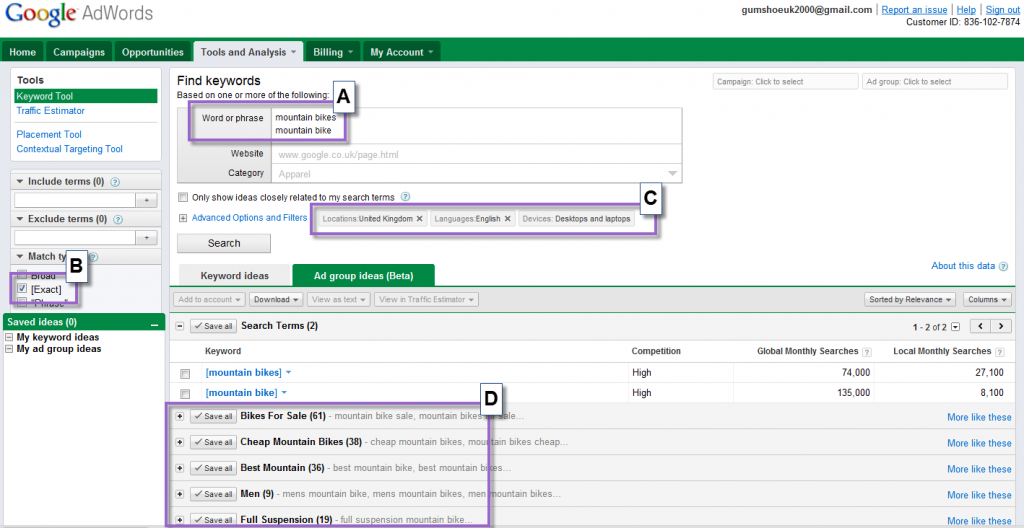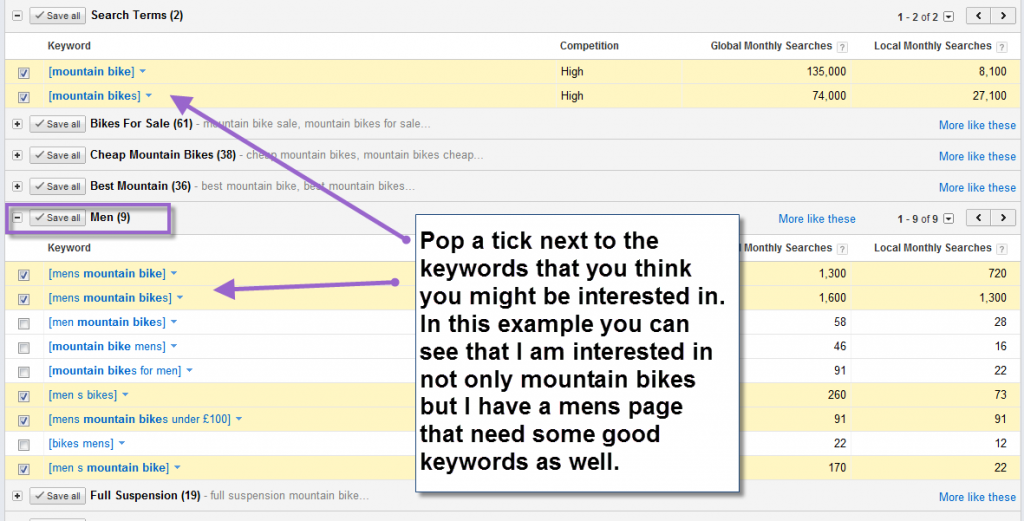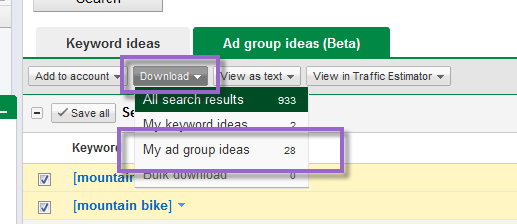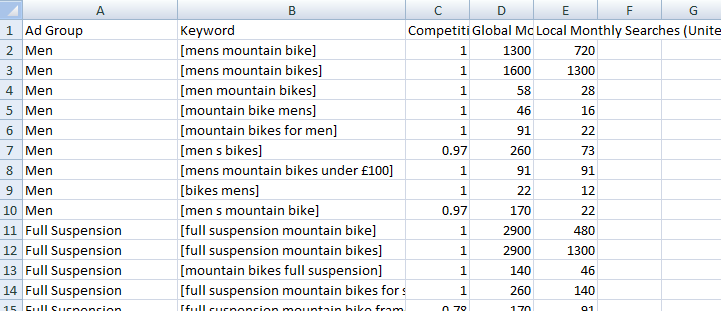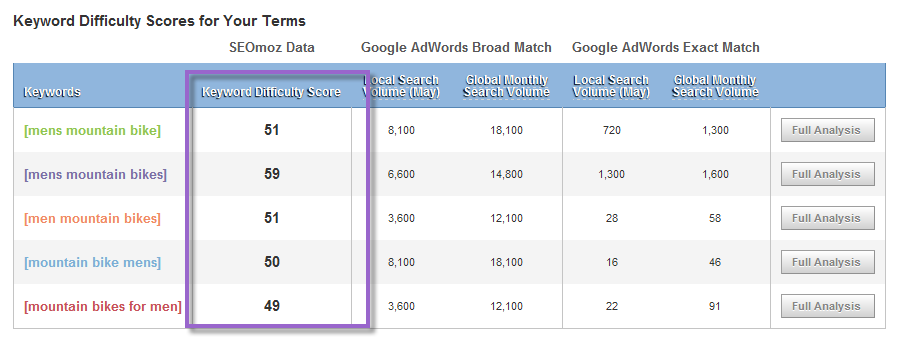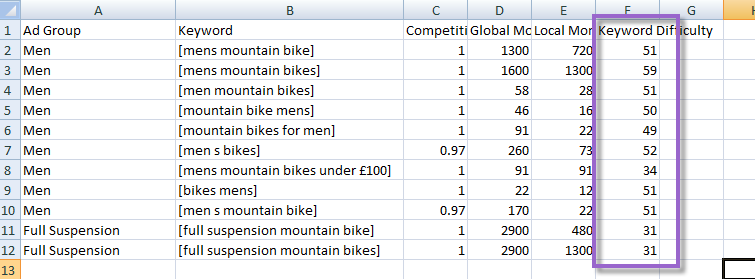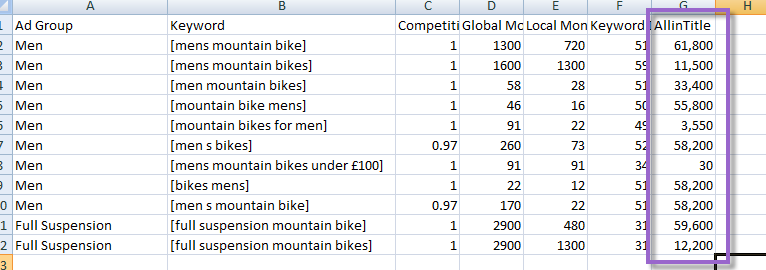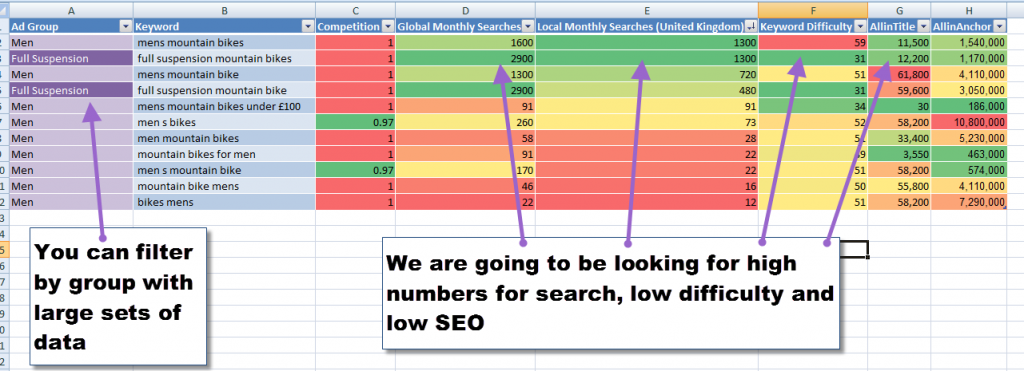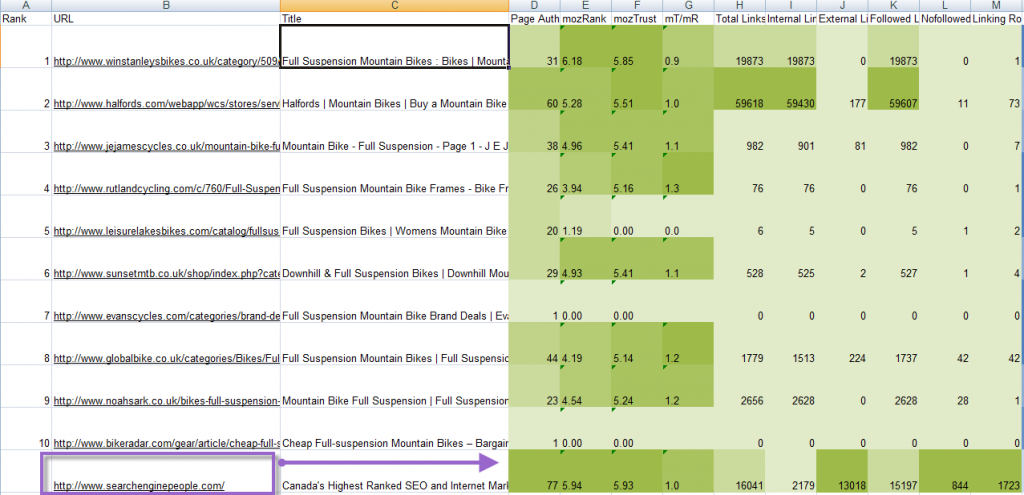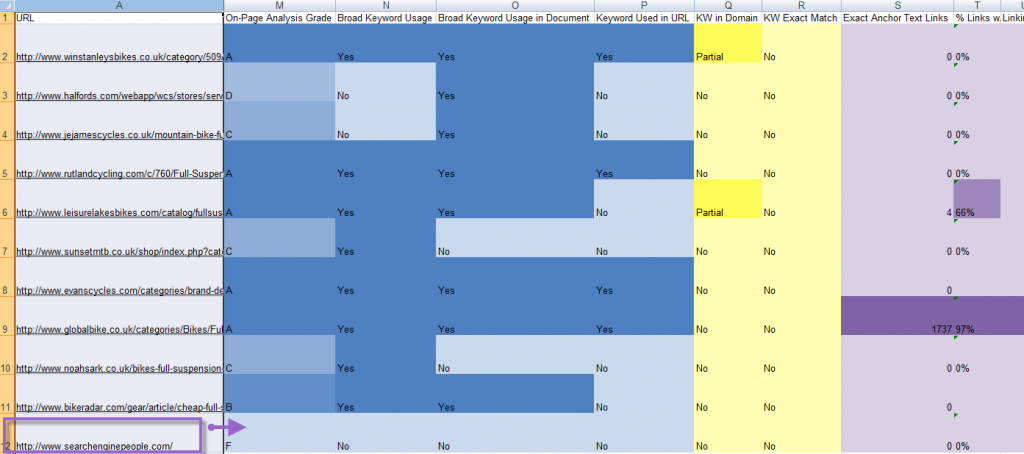Keyword Research is likely to be one of the first tasks you undertake in any online marketing project - but organising the data and making actionable decisions can be difficult for a business owner that is just starting out.
In this post we will look at how to make the data that you collect easier to understand and make sure that the keywords that you choose to target are realistic for your site.
Gathering the Data
The starting point for most people is going to be the Google Adwords Tool - it is the tool that most people know, its free and its easy to use. For the example that I am going to outline below is is this tool that we are going to use. It is worth noting that there are loads of other tools for gathering data that you may want to look at once you get a handle on this technique. As you become more confident with this data you may want to start to add data from other places to your spreadsheet to create a fuller picture of your vertical (SEMrush, Wordtracker,Ubersuggest, your Google Analytics data, site search data and Soovle all spring to mind for creating a bigger seed list).
What you need for this process:
- A Google Adwords account
- Excel
- An SEOmoz account
- A bit of time and patience
1. Get you keyword ideas together
If you are a small business then a simple brainstorming session will suffice here - at the end of the day you are going to have limited time and resources to invest in your online marketing and producing a list of 50,000 potential keywords just isn't actionable.
If you are a larger business with more budget feel free to use any of the other tools mentioned above to try and get your initial ideas together. This is essentially a seed list that will springboard you into other keyword possibilities.
2. Take the ideas that you have over to the Google Adwords Keyword Tool
Start copy and pasting your initial keywords into the tool to get some further keyword ideas. Being logged into your account will mean that you will get up to 800 possible ideas - when logged out you only get a 100.
For this example we will be choosing Exact Match to get a realistic number of people searching around those keyword.
What the match types mean (straight from the mouth of Google):
broad match - synonyms, related searches, and other relevant variations adopt kittens chicago
phrase match - "keyword" a phrase "adopt kittens" chicago
exact match- [keyword] an exact term or phrase [adopt kittens chicago]
3. Using the Adwords Keyword Tool correctly
A - Make sure that you pop your keyword ideas in here - don't go crazy inserting loads because it will reduce the possible keyword ideas that the tool will give you back. Try and stay on topic to a particular page or concept.
B - Make sure that you tick the correct Match Type - in this case Exact Match.
C - Pick your location, language and devices for the best possible keyword ideas.
D - In this example we are going to pick the Ad Group Ideas tab as it will help us group our keywords, make them easier to filter and apply yo the right pages on your site (or convince you to create new pages!).
4. Take your data and download it to .csv
5. Open up your .csv
You should have a nice little .csv with all the data that you have downloaded. For this I have taken a small sample set based on the keywords 'mountain bike' and 'mountain bikes' and will use this to guide you through make solid keyword choices. You should have 5 columns:
- Ad Group
- Keyword
- Adwords Competition
- Global Monthly Searches
- Local Monthly Searches
- Hundreds of rows of data make your head hurt and its difficult to make real decisions
- The competition column data is next to useless - how do you know if you can compete?
So we head on to the next step...
6. Take the keywords that you have chosen to SEOmoz
Fire up the SEOmoz Keyword Difficulty tool and paste in the keywords from your spreadsheet into their amazing little tool:
Alas, this is a long job as you can only paste in 5 at a time - but when you see the results (and the fact that there is no other tool that I know of that can do this) you will see that it is worth the investment.
Essentially this tool is going to let you know how difficult it will be to rank for this keyword based on around 40 different data points that the SEOmoz team have. It will throw something like this back at you:
Take these numbers and add them to your spreadsheet:
7. Add additional metrics
For this example we are going to go to Google itself and get a few data points (albeit ones that you have to take with a pinch of salt!). Here we are going to use the advanced search operators:
AllInTitle: - this returns the number of web pages where this particular keyword has been used in the page title
AllInAnchor: - this (allegedly) returns the number of pages that have backlinks with the keyword in it.
I concede that these are not perfect but they do give you a very rough idea about how much optimisation is happening around any given keyword - sort of!
Get those into your spreadsheet as well:
8. Right lets make this actionable
You are going to need some basic understanding of Excel here - but don't worry it is nothing fancy!!
Take your Ad group column and give each Ad group its own colour - this will make your life a lot easier as visually you now have clues. If you have a large amount of data you may want to filter the column and add each Ad Group to its own tab.
Add conditional formatting to all columns after the keyword column. For Adwords competition, Keyword Difficulty, AllinTitle and AllinAnchor you want to make sure that the high numbers are red. For Global and Local Search Volume the high numbers should be green.
Organise your data based on your preference - in this example I have sorted by high Local Monthly Searches which is probably what you will need to sort by as well.
Here's what it looks like:
Use the visual clues to make sense of the data and choose the keywords that have high volume, lower keyword difficulty and lower SEO activity around them, like so:
You now have some pretty solid data that you can review to make informed decisions about your keywords and your business...but it leaves one question unanswered...
9. Can my site can compete for the keywords I have chosen?
To answer this we head back over to the SEOmoz Keyword Analysis tool. Hidden away is a little button marked 'Run Full Report' and what this will do is look at the major ranking factors for the sites that are ranking in the top 10 for any given keyword - it shows linking metrics, on page optimisation metrics and social metrics.
What you can do is add your site as an addition to the top 10, which means the results that you get back are the top 10 ranking sites (and their SEO metrics) for that keyword plus your site (and your metrics). Here is the the spreadsheet with the data for 'full suspension mountain bikes' with the Search Engine People site as the additional website:
Looking at the data here the Search Engine People home page could own the keyword 'full suspension mountain bikes' based on link metrics!!
But when you look at the other data in the spreadsheet you can see that the on page optimisation for 'full suspension mountain bikes' for the Search Engine People home pages just isn't up to scratch:
Hopefully with the data from the first spreadsheet you can:
- Work out what keywords get decent search volume
- Figure out the difficulty of the SERP for those keywords
- Make keyword decisions based a number of data points rather than just one
If you then take the second spreadsheet and look at the most important keywords you have chosen you can:
- Work out realistic keywords that your site can compete on
- Make decisions about link building, how many links you need to compete and the anchor text percentages for the niche
- Make decisions on the on page optimisation for the pages that you want to get ranking for a particular keyword and adjust accordingly
Succes in SEO is not just about picking the right keywords but being realistic about the keywords you choose and whether your iste is trong enough to compete.

